|
Some
crime writers seem to have a
fictional afterlife of their own, shifting from plotters of crimes to
solvers
of them in works created by other hands.
In
recent years Edgar Allan Poe
has been a popular choice for this treatment, popping up in Andrew
Taylor's American Boy and Louis
Bayard's Pale Blue Eye while Arthur
Conan Doyle,
not above a spot of investigation in real life, is another perennial
favourite,
whether in the BBC's "Murder Rooms" series or "Twin Peaks"
co-creator Mark Frost's "List of Seven".
Most
bizarrely, dear old Agatha
Christie is set to be paired with the BBC's favourite Time Lord in the
next
series of "Doctor Who". Now another writer from the Golden Age of
British detection is being reinvented as a sleuth.
Inverness-born
Elizabeth
Mackintosh first found fame as the playwright Gordon Daviot, but it is
as the
crime writer Josephine Tey she is best remembered today and it is
Josephine Tey
who occupies centre stage in the debut novel of journalist Nicola
Upson, An Expert in Murder.
Nicola
has long considered
placing Tey within the pages of a book, but revealed her original aim
had been
fact rather than fiction. "I suppose it must have been 15 years ago
when I
read The Franchise Affair,”
Nicola
said down the phone from her Cambridge home. "I
was always very intrigued
by that very, very thin biographical note that you got at the front of
Penguin
paperbacks. I tried to find out more about her and it just so happened
that
Virago, the publisher, had a competition for a new proposal for a new
subject
for a biography, so I did that and I got shortlisted. I did lots of
fascinating
stuff. I talked to Sir John Gielguid and lots of her colleagues who had
worked
with her around the time of her play 'Richard of Bordeaux', so I had a
fairly
comprehensive picture of her professional life, but her private life
was still
a bit of an unknown. It's become a bit clearer since then."
It
was her partner who suggested
Upson use the research in a novel and the kind of novel Tey herself is
most associated
with, the detective story. "What you've got in An
Expert in Murder and the books that will follow it, is an
entirely fictional detective puzzle, but hung on actual events in Tey's
life
and it will follow the pattern of her life as she grows older," Nicola
added.
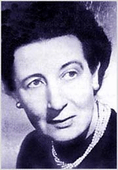 And it is "Josephine
Tey" who is the heroine of Nicola's books, not Elizabeth Mackintosh. "I
call her Josephine Tey because, though it follows the line of Elizabeth
Mackintosh's life, the voice of the woman in these books is really the
voice of
the personality that we get in those eight crime novels: the seven she
wrote as
Tey and the one which was published as Gordon Daviot at first," Nicola
continued. "That is really how people know her, so it seemed sensible
to
call her that."
And it is "Josephine
Tey" who is the heroine of Nicola's books, not Elizabeth Mackintosh. "I
call her Josephine Tey because, though it follows the line of Elizabeth
Mackintosh's life, the voice of the woman in these books is really the
voice of
the personality that we get in those eight crime novels: the seven she
wrote as
Tey and the one which was published as Gordon Daviot at first," Nicola
continued. "That is really how people know her, so it seemed sensible
to
call her that."
She
also conceded the use of the
Tey name was a way of distancing the character of her books from the
real
author who inspired them because though they are based on real life,
they are
not designed as an accurate biography.
However,
even Tey herself was
wont to use her pseudonyms, including the male pen-name Gordon Daviot,
in her
every day life. "She was quite strict about that," Nicola commented.
"Even close friends writing to her would use the name Gordon and when
she
constructed the Josephine Tey persona, she conducted all the Tey
business as
Tey. They were very different personas which people probably thought
was a bit
odd."
And
for anyone putting their own
fictional spin on the writer's life, these different personas and the
secret
aspects of Tey's life come almost tailor made. "You know, I could hug
her!" Nicola declared. "It is a gift because it’s this
business of
gaps being more interesting than facts. The facts we have
got are
fascinating and I find it really absorbing she could carry out this
double
life, one in Scotland and one in London where she
could become a completely
different person.
"I
imagine if someone had
met her down at London when she
stayed at a club they would have found it very hard to
recognise her. She was very good at keeping the canvas blank."
If
the books are successful,
Nicola would love to follow Tey through her life up to her death in
1952. "How
obliging of her to live through such fascinating years to write about
because
the social backdrop is wonderful," Nicola said. "It’s a very
strong
period and it’s interesting to see the circles that she moved
in because that
theatre set is fascinating. It’s like a parallel Bloomsbury which was
going on at the same time,
though they never met."
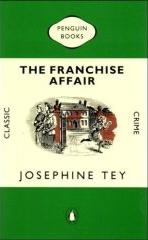 In contrast with her glamorous
life with the theatre set in London was Tey's
more restricted life at home in
provincial
In contrast with her glamorous
life with the theatre set in London was Tey's
more restricted life at home in
provincial
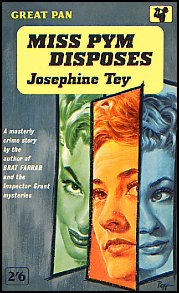 Inverness. "She had
to come home to look after
her father on her mother's death, but it annoys me the way people
portray that
as such a sacrificial thing for her because boy did she make the most
of
it!" Nicola said. "Her Inverness life was
not as duty bound or sad as people tend to
portray it. She had a beautifully situated house and she carved out her
own
life in Inverness. There's a
wonderful letter where she
talks about how, very early on, she made a decision that she wasn't
going to
buy in to this endless round of coffees in the morning and teas in the
afternoon. People thought she was very strange to do that. and at that
time
they didn't know she wrote, so she had no right to be strange. She
didn't
involve herself in the social life of Inverness. That
wasn't just her, that was her whole family. If
you talk to people in Inverness
who knew them, they very much refer to them as a family who lived
within themselves."
Inverness. "She had
to come home to look after
her father on her mother's death, but it annoys me the way people
portray that
as such a sacrificial thing for her because boy did she make the most
of
it!" Nicola said. "Her Inverness life was
not as duty bound or sad as people tend to
portray it. She had a beautifully situated house and she carved out her
own
life in Inverness. There's a
wonderful letter where she
talks about how, very early on, she made a decision that she wasn't
going to
buy in to this endless round of coffees in the morning and teas in the
afternoon. People thought she was very strange to do that. and at that
time
they didn't know she wrote, so she had no right to be strange. She
didn't
involve herself in the social life of Inverness. That
wasn't just her, that was her whole family. If
you talk to people in Inverness
who knew them, they very much refer to them as a family who lived
within themselves."
Tey’s
decision to leave her money
to the National Trust for England, rather
than any Scottish charity’s may
have also caused some bad feeling, Nicola suggested. "Because she wrote
about England so well as
well as Scotland
it’s too often seen as: ‘Did she love England or did she
love Scotland?’
Well, I think she loved both. If you
read something like The Man in the Queue
with that wonderful bit where she’s going back to Scotland by train,
nobody could doubt how she felt
about Scotland, she loved
it."
Not
as prolific as some of her
contemporaries, Tey remains a hugely influential writer. A poll of
British
Crime Writers Association members for the 1990 Hatchards
Crime Companion"saw her 1951 novel The
Daughter of Time top the list of
greatest crime novels (The Franchise
Affair just missed out on a top 10 place, being voted in at
number 11) and
its central device of a bed bound detective solving a historical crime,
in
Tey's case the murder of the Princes in the Tower, has since been
followed by
others including Colin Dexter in The
Wench Is Dead.
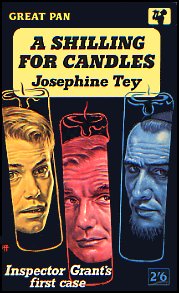
Tey
has also provided material
for film and television makers. Her early novel, A
Shilling for Candles inspired Hitchcock's 1937 film Young and Innocent, her 1948 novel The Franchise Affair was filmed for the
cinema in 1950 and television in 1988 and the 1980s also saw a
television
version of her romantic thriller of impersonation and false identity, Brat Farrar.
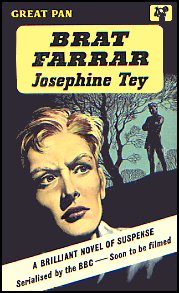
Nicola
acknowledged that
Tey does not enjoy the public profile of her contemporaries like Agatha
Christie or Dorothy, something she attributes in part to Tey's
relatively early
death in 1952. "She is, in that horrible phrase, a writer's writer.
People
as different as P. D. James and Val McDermid, even Raymond Chandler,
have really
rated her," Nicola said. "That popular thing hasn't happened but I
hope that will change."
Nicola's
books could play a big
part in that. The publication An Expert
in Murder has led to renewed interest in Tey and her works
and in France the
publication of Nicola's book has seen
Tey's own books republished. "It's getting the people to read one,
because
she's not an acquired taste. And the people who love her really love
her,"
Nicola said.
Nicola
also regards Tey as a very
modern writer. While the popular view of Tey is of someone warm and
reassuring,
the author took a very realistic view of the effects of crime rather
than just
a murder to provide an excuse for a puzzle.
"She
did a lot to make it
possible for us to write realistic fiction," Nicola said. "I don't
think she gets the credit she deserves."
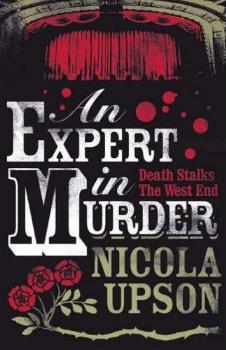
*
"An Expert in Murder"
by Nicola Upson, is published by Faber & Faber hardback
£12.99 March 2008 (978
0 571 23770 8) and trade paperback £10.99 (978 0 571 23907 8).
|


